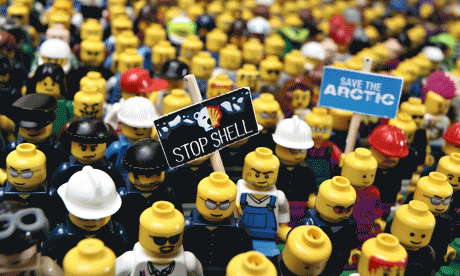Reprinted from The Guardian

Lego has said it won’t be renewing its relationship with Shell Oil.
(Image by Photograph: Jiri Rezac/Greenpeace/PA) Details DMCA
When the call came in that the University of Glasgow had voted to divest its 128m endowment from fossil fuel companies, I happened to be in a room filled with climate activists in Oxford. They immediately broke into cheers. There were lots of hugs and a few tears. This was big -- the first university in Europe to make such a move.
The next day there were more celebrations in climate circles: Lego announced it would not be renewing a relationship with Shell Oil, a longtime co-branding deal that saw toddlers filling up their plastic vehicles at toy Shell petrol stations. "Shell is polluting our kids' imaginations," a Greenpeace video that went viral declared, attracting more than 6m views. Pressure is building, meanwhile, on the Tate to sever the museum's longtime relationship with BP.
What is happening? Are fossil fuel companies -- long toxic to our natural environment -- becoming toxic in the public relations environment as well? It seems so. Galvanised by the "carbon tracker" research showing that these firms have several times more carbon in their reserves than our atmosphere can safely absorb, Oxford city council has voted to divest; so has the British Medical Association.
Internationally, there are hundreds of active fossil fuel divestment campaigns on university and college campuses, as well as ones targeting local city governments, non-profit foundations and religious organizations. And the victories keep getting bigger.
In May, for instance, California's Stanford University announced it would divest its $18.7bn endowment from coal. And on the eve of September's UN climate summit in New York, a portion of the Rockefeller family -- a name synonymous with oil -- announced that it would be divesting its foundation's holdings from fossil fuels and expanding its investments in renewable energy.
Some are skeptical They point out that none of this will hurt oil or coal companies -- different investors will snap up their stocks and most of us will keep buying their products. Our economies, after all, remain hooked on fossil fuels, and affordable renewable options are too often out of reach. So are these battles over fossil fuel investments and sponsorships just a charade? A way to clean our consciences but not the atmosphere?


